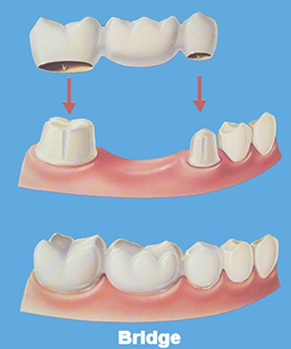
Dental bridges can be an excellent solution for replacing missing teeth when you have healthy adjacent teeth to support the restoration. They restore your ability to chew comfortably, prevent remaining teeth from shifting out of position, and improve your smile’s appearance. However, the suitability of a bridge depends on your specific oral health situation, the condition of neighbouring teeth, and your long-term dental goals.
What exactly is a dental bridge and how does it work?
A dental bridge is a permanent restoration that replaces one or more missing teeth by anchoring artificial teeth to your natural teeth on either side of the gap. The replacement tooth (called a pontic) sits in the space where your tooth is missing, while crowns attached to adjacent teeth (called abutment teeth) hold the entire structure securely in place.
The bridge works by distributing chewing forces across multiple teeth rather than leaving a gap that weakens your bite. Your dentist prepares the abutment teeth by removing a small amount of enamel to create room for the crowns that will support the bridge. Custom-fabricated porcelain matches your natural tooth colour, creating a seamless appearance that blends with your existing smile.
This restoration becomes a fixed part of your mouth, meaning you cannot remove it like dentures. The permanent nature of dental bridges and crowns provides stability for eating and speaking whilst protecting your overall oral health by maintaining proper tooth alignment.
What are the main benefits of getting a dental bridge?
Dental bridges offer numerous advantages that improve both function and appearance. They restore your ability to chew food properly, which supports better nutrition and digestion. The restoration prevents neighbouring teeth from drifting into the empty space, which could otherwise cause bite problems and jaw discomfort over time.
Beyond practical benefits, bridges significantly enhance your smile’s appearance by filling visible gaps that may affect your confidence. They also support your facial structure by maintaining the natural contours of your cheeks and lips, which can change when teeth are missing for extended periods.
The treatment timeline for bridges is relatively quick compared to other teeth replacement options. Most patients complete the process in just two to three appointments over several weeks. You’ll leave with a restoration that feels natural, functions like your own teeth, and requires no special removal or soaking routines.
Are there any downsides or risks to dental bridges?
Whilst bridges offer many benefits, they do require modifying healthy adjacent teeth to serve as anchors. Your dentist must remove enamel from these supporting teeth to accommodate the crowns, which permanently alters their structure. This consideration matters particularly if those neighbouring teeth are completely healthy and cavity-free.
Bridges also demand more thorough cleaning than natural teeth. Food particles and bacteria can accumulate underneath the pontic where it meets your gum tissue, requiring special flossers or interdental brushes to maintain proper hygiene. Without diligent care, decay can develop on the abutment teeth hidden beneath the crowns.
Another limitation is that bridges don’t prevent the bone loss that naturally occurs when tooth roots are missing. Over time, this can affect the fit of your restoration and the appearance of your gum line. Some patients experience temporary sensitivity in the supporting teeth following placement. We can assess your specific situation during a consultation to determine whether a bridge addresses your needs or if alternative treatments might serve you better.
How long do dental bridges typically last?
Dental bridges generally last between 5 and 15 years with proper care, though many patients enjoy even longer lifespans from their restorations. The durability of your bridge depends on several factors, including the quality of materials used, the health of supporting teeth, and how well you maintain your oral hygiene routine.
Your daily habits significantly influence bridge longevity. Excellent brushing and flossing, regular professional cleanings, and avoiding habits like chewing ice or using teeth as tools all help maximise your restoration’s lifespan. The forces you place on your bridge through chewing also matter, which is why bridges in the back of your mouth may wear differently than those replacing front teeth.
You’ll know it’s time to consider replacement when you notice looseness, visible damage, or decay developing around the supporting teeth. Regular dental examinations allow us to monitor your bridge’s condition and address small issues before they become significant problems. Scheduling an evaluation appointment helps ensure your restoration continues serving you well for years to come.
How do you know if a dental bridge is right for you?
You’re likely a good candidate for a dental bridge if you have one or more missing teeth with healthy, strong teeth on either side of the gap. The adjacent teeth need sufficient structure and stability to support the restoration long-term. Your gums should be healthy without active periodontal disease, and you should be committed to maintaining excellent oral hygiene.
Bridges work particularly well when you want a relatively quick, permanent solution and prefer not to undergo surgical procedures. They’re often more affordable than dental implants whilst still providing excellent function and aesthetics. However, if your neighbouring teeth are pristine and you’d prefer not to modify them, or if you’re missing multiple teeth in different areas, alternative treatments might better suit your situation.
Consider your budget, timeline preferences, and long-term dental health goals when making this decision. Think about questions to ask during your consultation, such as how the bridge will affect adjacent teeth, what maintenance it requires, and what happens if supporting teeth develop problems later. We encourage you to request an appointment at Ocean Dental & Aesthetics for a personalised evaluation. We will assess your specific oral health situation and help you understand which teeth replacement options align best with your needs and goals.
